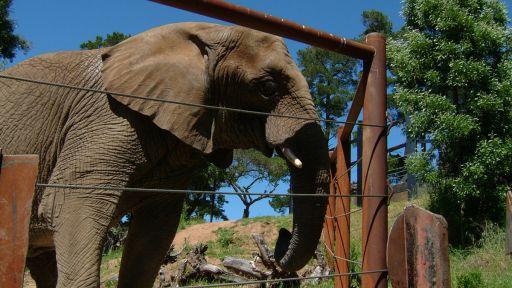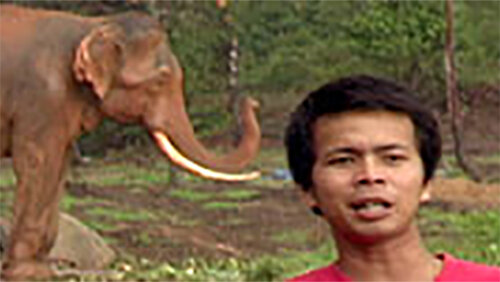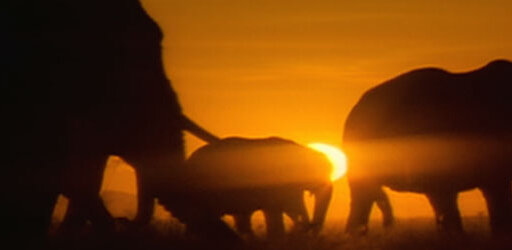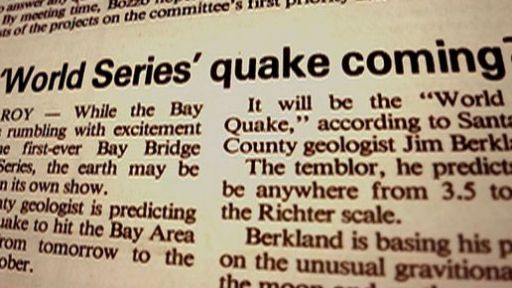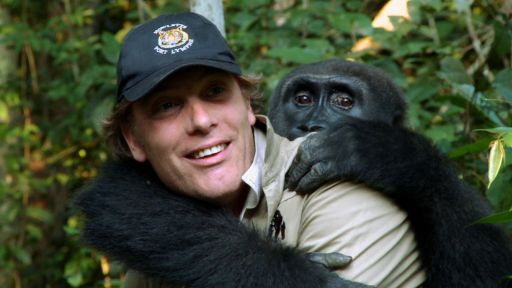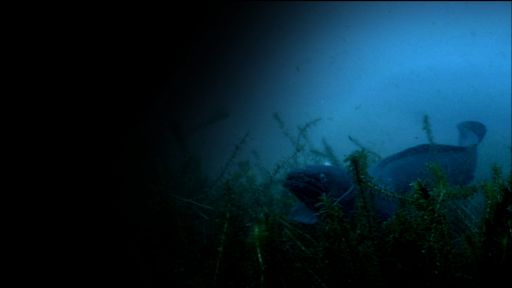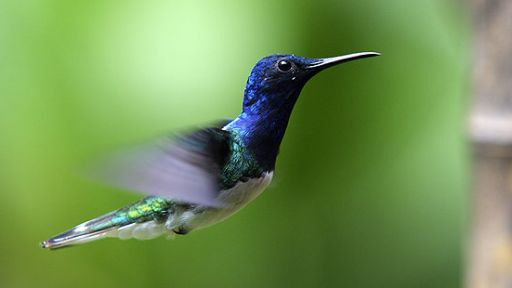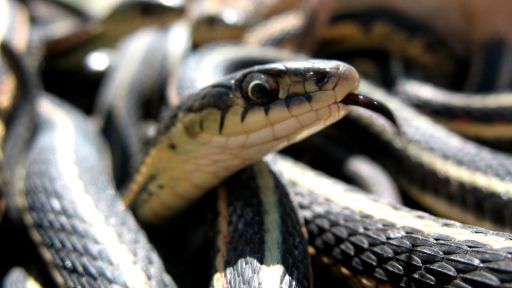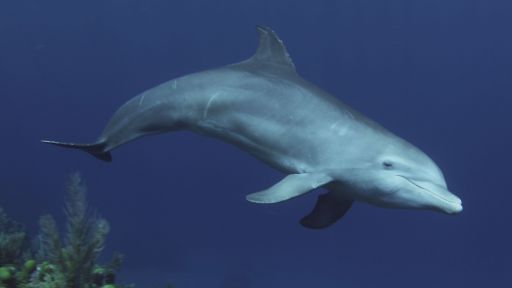Ravi Corea is the founder and president of the Sri Lanka Preservation Society. On the evening following the tsunami, he surveyed Sri Lanka’s southern coast to assess the damage to the vegetation and animals.

What did you find during your search?
One of the things I noticed was that in all that destruction, I did not see any carcasses on the roadside. When I inquired, it was not as if people moved them. There were really not that many animal casualties. I am talking about domestic animals at this stage. In Sri Lanka, almost every town has a population of stray animals, camels, goats, dogs, pigs, chickens, and cats. I didn’t see any of these animals dead except for those that were tied or in cages, which of course perished.
Once I got the to the national park, it was the same thing. I didn’t see any casualties, which was also verified by park personnel. About 50 visitors died there, but those were the only incidents. And when I went, animals were already moving back. The damage seemed to be mostly to the vegetation, and probably to some of the beachhead. And of course, any kind of human structures that were there, like the park lodge and the cafeteria, that all got destroyed. What we saw when we were going through ecological assessment, for the most part, was that wherever that were natural barriers, for example, sand dunes, the impacts were minimal.
In a sense, the tsunami was entirely a human disaster; it was not too much of an ecological disaster. Of course it washed away some beaches, and in fact some turtles, sea turtles, were carried far inland, you know, like 2 kilometers (1.2 miles) in, and these turtles are trying to make [it] back into the sea, so in some cases they had to be carried back and put into the sea.
Where you surprised that you did not find any dead animals?
I was expecting at least SOME casualties. You saw incredible damage, and sometimes you wonder, who could have survived? In hindsight, you shouldn’t be surprised too, because most animals are in tune to their environment. They are always paying attention to what’s going around them, unlike humans — we tend to forget our environment, we get so [pre]occupied and so focused on what we are doing. But for animals, it’s exactly the opposite. That’s how they survive, always paying attention to what is going on. Also, if anything happens that they cannot understand, they take flight. They don’t stop to go close to it, to find out what the hell is going on. Also, their senses are much more highly evolved … their [sense of] smell, their hearing especially, and their eyesight too, in most cases. For instance, when the first wave came and it receded back, opening a kilometer of the coast up to the reef, people went into the sea. No animal would do that, you know? When the second wave came, there were all the people in the sea.
Did you see unusual animal behavior prior to the tsunami?
Half an hour before the tsunami happened, there was an elephant right in front of the hotel, and that is exactly where the waters came. So by the time the waters came, the elephant had moved away — he was way up on the sand dunes, opposite the hotel. Then, another good friend of mine saw [nocturnal] bats flying away, half an hour before the tsunami. And there is another friend of mine who has a house right by the beach, and he has two dogs that go for a run every day. But on that particular day the dogs were not excited at all to go with him. They were very reluctant, and that probably saved his life. So they had the idea that something was not quite right with the sea that day. So … it seems that animals have had better awareness of something not really right. Now, to an extent as if it is a sixth sense is a different story … it is just their sensory perception is so acute.
What kind of heightened senses do you think animals have that allowed them to get an early warning?
I would say it was auditory, because listen to the ocean now: there is a certain sound to it. And when a tsunami happens, I am sure it changes, obviously it has to change, you know, because physical changes happen. But if you don’t have the proper apparatus to notice that change, you’re not going to feel the change. But if you do, you know something’s wrong. When a huge vertical displacement of land mass has happened, which causes a displacement of a huge mass of water, it is making a lot of noise somewhere. So I think most of the animals were responding to sound waves at different registers. As humans our hearing is a narrow band compared to the spectrum of auditory waves — from infrasonic to high frequencies — which we don’t have [the ability to hear].
There are a lot of stories with elephants and dogs. Elephants have incredible hearing at lower registers. Dogs have very keen smell and very good hearing, especially at the higher frequencies. So obviously they had the necessary senses to listen to something and know that there was something not right.
Bats have incredible sensory perception. They communicate by using sonar, they have very good sonar receptions. So obviously they hear intensely. During the tsunami, for instance, they were hearing stuff that we have no clue about.
Do you think animals sent out warnings to other animals or even to humans?
Animals have a very good communication network. In some cases, it is just a few animals that are giving the warning, and I think it is a good enough warning that it goes down the network. And then everyone starts running. Now for instance, there was a nature guide … he knew the best thing to do was to follow the monkeys because they would know the shortest, safest route out of this mess. So that’s what he did, he followed the monkeys, and he saved himself. It would be nice to see how far down the animal kingdom [the line of communication goes] and [at] what point the warning stops. But I know that mammals and birds take a cue from one another.
Why do you think the animals survived?
The simplest explanation is that these animals have a very good, well-developed sense, coupled with an immediate flight response. And that’s a very good combination. The way they respond to information that they get makes them outstanding.
The part of this that makes it such a good story is that we are genetically programmed to believe in supernatural things. In any population no two animals are the same, so [some] elephants had no idea what was going on and they stayed put, but in some areas there are elephants that responded. But the point is, we don’t know this. We don’t have a large enough sample to make a definite conclusion about any of this stuff. Some animals have better developed senses than others. We know there is an information network, but we don’t know if all the animals are responding to the same information, and how they respond. … The day we can really communicate with animals to the extent of language, maybe we will find out. But until then, all of this is going to be at most a best guess.
Do you think we will be able to find out and use animals’ “sixth sense”?
It’s not like tsunamis are happening all over the world, that you can take a bunch of animals and go send them off and then look at them, and, you know, do your observation work, [collect] data, and see how they are responding. I think … people have totally misunderstood the meaning of “sixth sense.”
We always use our senses. I mean, we use dogs for drug sniffing, to find people buried under snow in avalanches; we use pigs to look for truffles; we use elephants for various things. People are not even looking at the senses of animals. Now we want to know: if animals have an additional sense, above and beyond these five senses, [if] they can warn us of events that have not even happened. From what I know, I don’t think they can.
And the thing for me is … that if this idea really catches on, a lot of animals are going to be susceptible to unnecessary research. … The better approach is to pay attention to nature. Tsunamis are a part of this earth’s history. It’s part of this earth’s image and legacy. It’s the same thing with hurricanes, cyclones, earthquakes, and volcanoes, you know? They are bad for us, but they are good for the earth. They are always going to be a part of this earth. Otherwise, if they all of a sudden stop, that is the end of us too.
What we should really pay attention to is what we have learned from this tsunami. And we did learn some very good things. We know natural barriers, they are cost effective, you don’t need to invest a lot money on heavy-duty high-technology equipment that most countries can’t even afford. Sri Lanka, India, Bangladesh, Indonesia can’t afford high-tech hearing and listening and satellite, and all this stuff. But natural barriers are there, there is no maintenance, no repairing. And then from this tsunami we know exactly what kind of areas water came through, so don’t have any development happen there … move people away from there. We are supposed to be the more intelligent animals here, right? The more intelligent, the more resilient, the more adaptive. Use these positive abilities to make life safer for humans.

